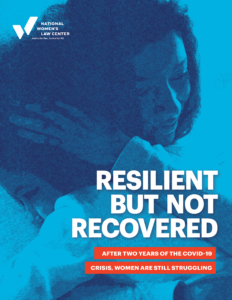What We Found
Note: In March 2022, survey data were weighted by age, race, and census region to reflect the U.S. population; in June 2022, income weights by race were also applied, leading to small data adjustments from the prior reports.
The data is sobering. More than two-thirds of the net jobs lost since the pandemic began are women’s jobs—and while men have returned to their pre-pandemic labor force size, over 1.1 million fewer women were in the labor force in February 2022 than in February of 2020.
In addition, women have shouldered most of the new and persistent unpaid caregiving demands wrought by COVID-19, which have too often forced them to make impossible choices between maintaining their jobs and caring for their families. Among parents who lost or quit a job during the pandemic, only 46 percent of mothers have gotten a new job, compared to 76 percent of fathers.
The recovery has been uneven: many women—particularly Black women, Latinas, and other women of color—are still struggling to make ends meet. More than one in three women—including 60 percent of women who lost or quit a job during the pandemic and 48 percent of women in jobs paying $15/hour or less—say their family’s financial situation is worse today than before the pandemic, compared to 22 percent of men. And 57 percent of women report that the COVID-19 pandemic has had a negative impact on their mental health.
As we enter the third year of the pandemic, it has never been clearer that policies to bolster families’ incomes, ensure access to health care—including mental health support and reproductive health care—without cost barriers, and help people both work and care for their loved ones are essential to drive a full and equitable recovery. Delivering these long overdue reforms will ensure we build a new and better economy that finally works for women—and for all of us.

